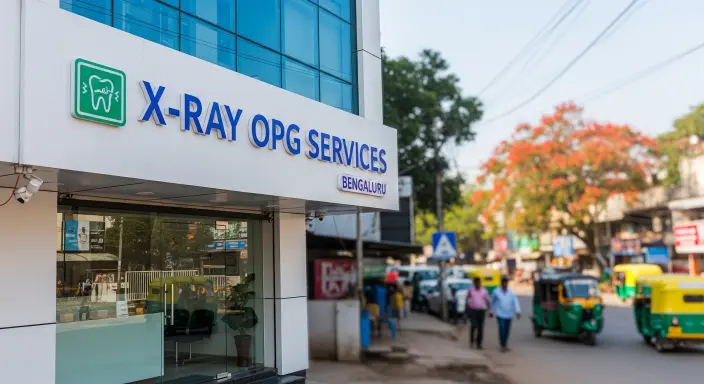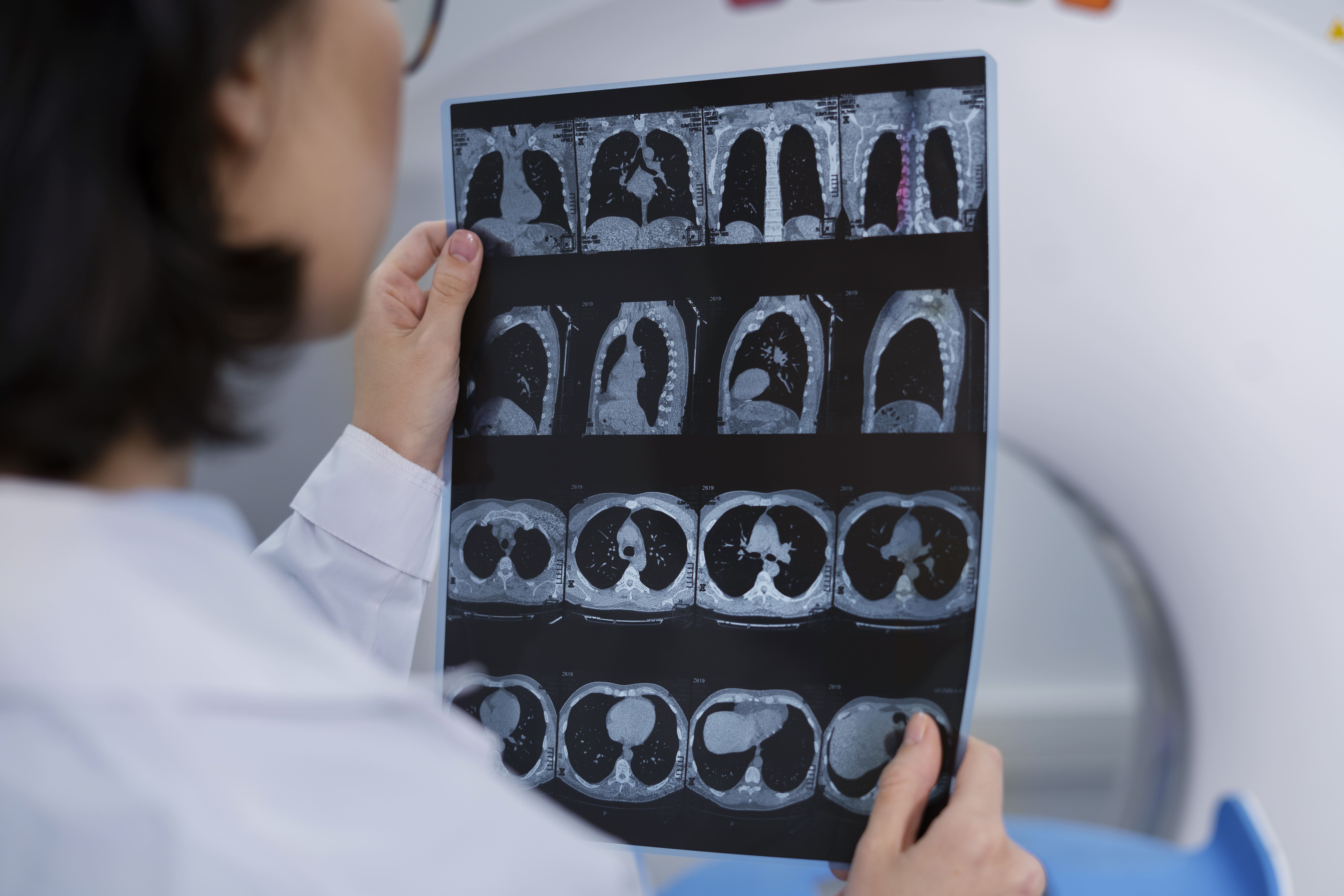
enquiry@ecotowndiagnostics.com
Send Your Mail 24/7 Support
Mon - Sat 6:30AM - 10:00PM
Sunday 6:30AM - 3:00PM
enquiry@ecotowndiagnostics.com
Send Your Mail 24/7 Support
Mon - Sat 6:30AM - 10:00PM
Sunday 6:30AM - 3:00PM

Medical imaging has revolutionized how doctors diagnose and monitor diseases. Among these imaging techniques, Computed Tomography (CT) stands out as a highly effective and widely used tool. But when your doctor recommends a CT scan, you might hear the terms “with contrast” or “without contrast”. Understanding the difference between these two can help you make informed decisions about your health.
We will explain the purpose, process, benefits, and risks of both types of CT scans in Bangalore backed by reliable medical sources so you’ll know exactly what to expect.
A CT scan uses a series of X-ray images taken from different angles and computer processing to create detailed cross-sectional views of bones, blood vessels, and soft tissues. It is far more detailed than a standard X-ray and can reveal abnormalities that might otherwise go unnoticed.
CT scans are used in diagnosing a range of conditions, from internal injuries and tumors to infections and vascular diseases. In cities with advanced medical infrastructure, such as those offering CT scan in Bangalore, these services are widely available and performed by trained radiologists.
A CT scan without contrast means no additional dye or enhancing agent is used during the procedure. The scan relies solely on standard X-ray imaging technology to capture details.
Common Uses:
Detecting bone fractures
Identifying lung issues like pneumonia or fibrosis
Locating kidney stones
Assessing head injuries or internal bleeding
Advantages:
Quicker and simpler process
No risk of allergic reaction to contrast dye
Suitable for patients with kidney problems or dye allergies
Lower cost compared to contrast scans
Limitations:
May not show small tumors or subtle inflammation
Less effective at highlighting blood vessels and soft tissue differences
In this type of scan, a special dye often iodine-based is introduced into the body, either orally, intravenously, or rectally, depending on the area being examined. This contrast agent enhances the visibility of blood vessels, organs, and tissues in the images.
Common Uses:
Detecting tumors and cancer staging
Evaluating blood flow in arteries and veins
Identifying internal bleeding sources
Assessing organ function in the liver, pancreas, kidneys, and brain
Advantages:
More precise imaging of soft tissues and blood vessels
Better detection of abnormal growths or infections
Useful for guiding biopsies or surgeries
Limitations:
Slightly longer procedure
Possible allergic reactions to the contrast dye
Not recommended for certain kidney conditions
Slightly higher cost than non-contrast scans
|
Feature |
Without Contrast |
With Contrast |
|
Imaging Detail |
Good for bones and lungs |
Better for soft tissue and blood vessels |
|
Use Case |
Trauma, lung issues, fractures |
Tumors, vascular diseases, organ evaluation |
|
Procedure Time |
Shorter |
Slightly longer |
|
Risks |
Minimal |
Risk of allergic reaction/kidney strain |
|
Cost |
Lower |
Higher |
The decision depends on your symptoms, medical history, and the area of concern. For example:
Head Injury: Non-contrast CT to quickly detect bleeding.
Suspected Tumor: Contrast CT to highlight abnormal growths.
Kidney Stones: Non-contrast CT to clearly visualize stones.
Suspected Pulmonary Embolism: Contrast CT to detect clots in lung arteries.
Radiologists may also recommend starting with a non-contrast scan, followed by a contrast scan if needed.
For a Non-Contrast CT:
Minimal preparation required
Remove any metal objects
Wear comfortable clothing
For a Contrast CT:
Fasting for 4–6 hours may be necessary
Blood test to check kidney function (especially for IV contrast)
Inform the doctor of any allergies or medical conditions
Both types of CT scans involve exposure to a low dose of radiation. While the risk is minimal for most patients, unnecessary or repeated scans should be avoided unless medically necessary.
For contrast scans, the main risks include:
Allergic reaction: Mild itching to severe reactions (rare)
Contrast-induced nephropathy: Temporary kidney function decrease in susceptible individuals
According to the U.S. Food and Drug Administration (FDA), severe allergic reactions to contrast agents occur in less than 1% of cases.
The cost varies by location, hospital type, and whether contrast is used:
CT Scan Without Contrast: ₹1,500 – ₹4,000
CT Scan With Contrast: ₹3,500 – ₹7,500
Advanced diagnostic centers offering CT scan in Bangalore often provide packages that include both non-contrast and contrast imaging for comprehensive diagnosis.
The right choice isn’t about which is “better” overall but which is most appropriate for your medical needs. Your doctor’s decision is based on:
The condition being investigated
The type of detail required
Your medical history and allergies
Urgency of diagnosis
If you have kidney problems or a history of allergic reactions, your doctor may opt for a non-contrast scan or choose a different imaging method like MRI or ultrasound.
Share Complete Medical History: Especially allergies and kidney issues.
Follow Pre-Scan Instructions: Fasting or hydration as advised.
Ask About Alternatives: If you’re concerned about contrast risks.
Choose Accredited Centers: Look for NABL-accredited imaging facilities for accurate results.
Many patients choose well-established diagnostic centers for their CT scan in Bangalore to ensure the highest quality imaging and professional expertise.
Understanding the difference between a CT scan with contrast and without is essential for making informed healthcare decisions. Both have unique roles — non-contrast scans excel in speed and safety for certain conditions, while contrast scans offer enhanced detail for more complex diagnoses.
Ultimately, the best choice is one guided by a qualified doctor and performed in a trusted diagnostic facility. If you need a CT scan in Bangalore, consult with your healthcare provider to determine which type is right for you based on your symptoms, health status, and diagnostic goals.